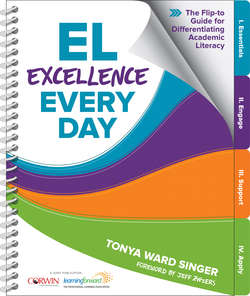Читать книгу EL Excellence Every Day - Tonya Ward Singer - Страница 14
На сайте Литреса книга снята с продажи.
Who Are ELs?
ОглавлениеAn English learner is a student who speaks another language besides English and has yet to demonstrate full proficiency in English on local measures of English proficiency. Students classified as “EL” are as diverse and different from one another as any students in your classroom. ELs come to school with a wide range of home languages, cultures, and proficiency levels in English. Some ELs speak no English; others have high levels of oral proficiency and only need support with academic language and literacy to thrive in schools. Other terms we often use to communicate the diversity within school EL populations include the following:
Newcomer: An EL new to U.S. schooling with emerging English proficiency.
Reclassified Fluent English Proficient (R-FEP): An EL student who was reclassified to fluent based on local criteria including multiple measures such as an English proficiency exam, writing samples, standardized tests, and/or teacher discretion.
Long-Term English Learner (LTEL): A student who has been in U.S. schools for six or more years and has not been reclassified to R-FEP. Note this definition varies by region. LTELs, and students at risk of becoming LTELs, make up a significant percentage of the EL population in many regions. In California, for example, where LTEL is measured as 7+ years in California schools, 74 percent of secondary ELs are LTELs (Californians Together, 2015).
Standard English Learner (SEL): A student fluent in an English dialect with rules of grammar and syntax that are different from Standard English. African American Vernacular English, Chicano English, and Hawaiian Pidgin are three examples of primary languages that are cultural and linguistic assets for SELs in the United States.
Student With Limited or Interrupted Formal Education (SLIFE): This term refers to a small percentage of the EL population who have limited or interrupted formal schooling in their native language and are below grade level in most academic skills. Reasons for limited formal schooling vary widely by students who may be refugees, migrant students, or students who have had limited opportunities for schooling in their home country due to location, poverty, or other variables.
Seal of Biliteracy Students: Many schools, districts, and states in the United States now award a Seal of Biliteracy to recognize students who have studied and attained proficiency in two or more languages by high school graduation. Both ELs and students who begin school only speaking English can strive for this accomplishment! Dual-language learners are students learning in two languages on a path toward biliteracy.
